 Petzlover
Petzlover Tuxedo is originated from United States but Ukrainian Levkoy is originated from Ukraine. Both Tuxedo and Ukrainian Levkoy are having almost same weight. Tuxedo may live 5 years more than Ukrainian Levkoy. Both Tuxedo and Ukrainian Levkoy has same litter size. Tuxedo requires Moderate Maintenance. But Ukrainian Levkoy requires Low Maintenance
Tuxedo is originated from United States but Ukrainian Levkoy is originated from Ukraine. Both Tuxedo and Ukrainian Levkoy are having almost same weight. Tuxedo may live 5 years more than Ukrainian Levkoy. Both Tuxedo and Ukrainian Levkoy has same litter size. Tuxedo requires Moderate Maintenance. But Ukrainian Levkoy requires Low Maintenance
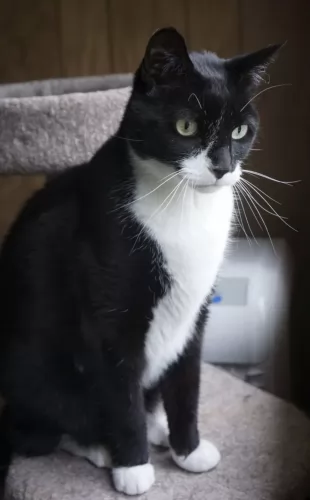 The Tuxedo cat is essentially a black and white cat and the name comes from him looking like he is dressed in a formal tuxedo.
The Tuxedo cat is essentially a black and white cat and the name comes from him looking like he is dressed in a formal tuxedo.
Tuxedos aren’t a new cat breed and they have been around for thousands of years. Tuxedo is merely describing the coat of the cat. So the Tuxedo cat isn’t a cat breed but rather a pattern color. A Persian cat as an example, can be a tuxedo cat because of its coat.
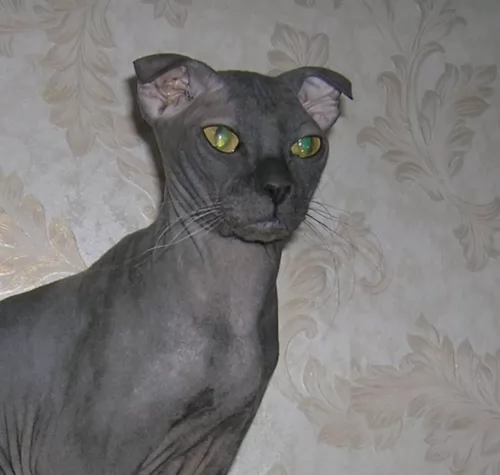 The Ukrainian Levkoy is a distinctive looking cat with its folded ears. This is a new breed of cat, only being developed recently early in the 2000s.
The Ukrainian Levkoy is a distinctive looking cat with its folded ears. This is a new breed of cat, only being developed recently early in the 2000s.
The cat was first developed by Elena Biriukova in Ukraine, by crossing the hairless Donskoy cat with the Scottish Fold. Also, Oriental and domestic cats were also brought into the mix.
This particular cat breed was recognized in 2005 in Ukraine and recognized in Russia in 2010. The cat isn’t recognized by any of the major international cat organizations.
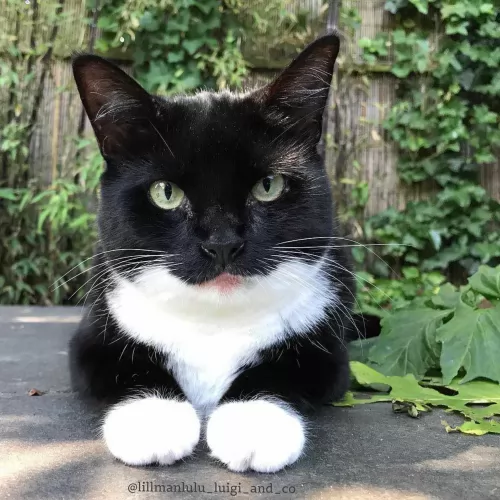 A tuxedo cat has distinct coat colors. Their bicolor coats are soft and sleek and sometimes the colors aren't limited to just black and white but they can be orange, gray or tortoiseshell.
A tuxedo cat has distinct coat colors. Their bicolor coats are soft and sleek and sometimes the colors aren't limited to just black and white but they can be orange, gray or tortoiseshell.
Because Tuxedo cats aren’t a breed, nothing is really set in stone with them and their size ranges. This means he can weigh between 3 and 7kg or 8 or even 9kg. The eyes of the Tuxedo cat are nearly always green.
The Tuxedo cat’s personality is varied as well because it can be any breed of cat. There are some Tuxedo cat owners who will say that their cats have a definite Tuxedo personality, but there is no research that indicates that these cats have a particular personality.
They are all different. Most Tuxedo cats however are friendly, social, loving, and lively.
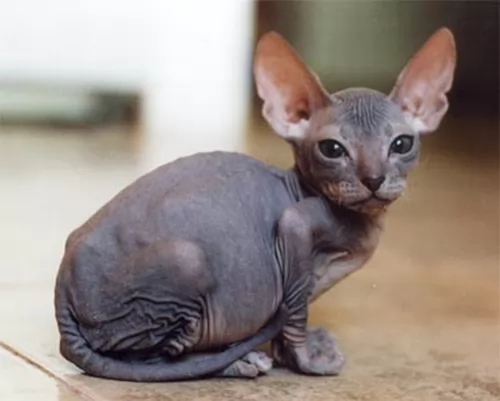 With his distinctive appearance, the medium-sized, muscular but slender Ukrainian Levkoy cat weighs in the region of 3 to 6kg.
With his distinctive appearance, the medium-sized, muscular but slender Ukrainian Levkoy cat weighs in the region of 3 to 6kg.
He has these inward-folding ears with very little hair. These are two distinctive features of this cat. The skin is soft and wrinkled, the eyes large and almond-shaped while the ears are also large and set wide apart and high on the wedge-shaped head.
He has long, slender legs and a narrow tail. The litter size of these cats is generally 3 to 6.
Friendly and playful, the Ukranian Levkoy is also intelligent and enjoys having human companionship.
He is social and will make friends of other pets in the house. He is also compatible with children.
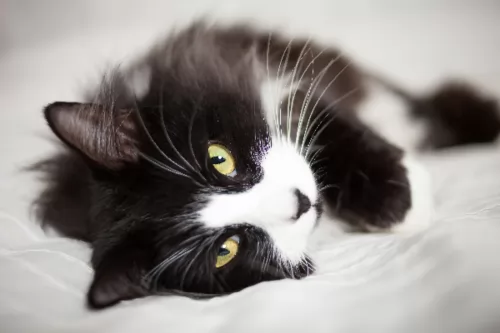 The tuxedo cat is such a sport - always up for fun and games. Cats like the tuxedo are always a great choice of pet.
The tuxedo cat is such a sport - always up for fun and games. Cats like the tuxedo are always a great choice of pet.
Cats like the tuxedo are also low maintenance and he is clever enough to even have a bit of training.
The tuxedo cat, even though he likes the outdoors, can also be an apartment cat. He also gets on well with children and other pets in the home. Having a tuxedo in the home is guaranteed to fill your home with joy, and you owe it to him to provide him with lots of love and attention.
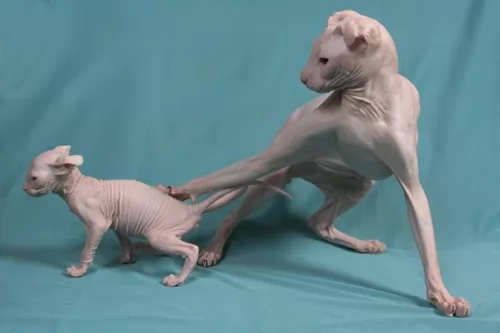 The Ukrainian Levkoy, even though he is fairly docile, is a very sociable cat that thrives on human interaction.
He is able to get on well with children as well as with other pets. He is also quite a vocal cat and will let you know when he is hungry or wants to play. Some call them ugly and others call them sweet - whatever you make of the Ukranian Levkoy, he needs your love and care to be the best pet he can be.
The Ukrainian Levkoy, even though he is fairly docile, is a very sociable cat that thrives on human interaction.
He is able to get on well with children as well as with other pets. He is also quite a vocal cat and will let you know when he is hungry or wants to play. Some call them ugly and others call them sweet - whatever you make of the Ukranian Levkoy, he needs your love and care to be the best pet he can be.
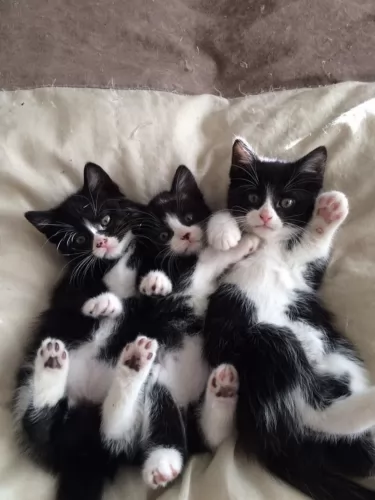 The Tuxedo cat has no real health concerns and that is just another reason why they make such popular pets. There are, however, always health issues that a cat can succumb to.
The Tuxedo cat has no real health concerns and that is just another reason why they make such popular pets. There are, however, always health issues that a cat can succumb to.
This is caused by kidney disease. It is one of the leading causes of death in older cats, and causes can include age but also genetics.
Your cat can show a number of symptoms such as excessive urination, nausea, terrible thirst, dehydration, constipation, and loss of appetite.
There is no cure for feline kidney disease but it can be treated and managed, and that is why you will need to see the vet.
This is the dreaded feline distemper for which your cat will need to be vaccinated against. It is a highly contagious viral disease, with kittens being more at risk.
After contracting the disease. It can spread through bodily fluids as well as fleas and is mostly transmitted by contaminated food and water bowls as well as litter trays.
The disease affects the intestinal tract of the cat and attacks the immune systems. Your cat will be vomiting, have diarrhea and anemia and he will have loss of appetite, lethargy and be totally and utterly down in the dumps.
Cancer is common in cats of all ages. When you brush your Tuxedo, be aware of any unusual lumps. Lymphoma is a common cancer in cats.
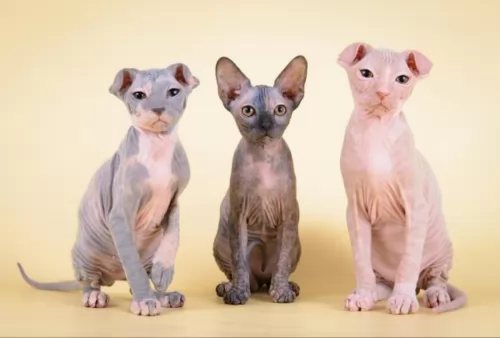 These cats are generally considered to be healthy cats. Having said that, they can be predisposed to the same conditions that the Donskoy and Scottish Fold breeds face.
These cats are generally considered to be healthy cats. Having said that, they can be predisposed to the same conditions that the Donskoy and Scottish Fold breeds face.
It is always beneficial to know and recognize some of the symptoms of a sick cat - lethargy, vomiting, diarrhea, heavy breathing and lack of appetite. Then it's time to schedule a visit to your local vet.
While there aren't any breed-specific health problems associated with the Ukrainian Levkoy, it is imperative to have him vaccinated against the deadly cat diseases that there are.
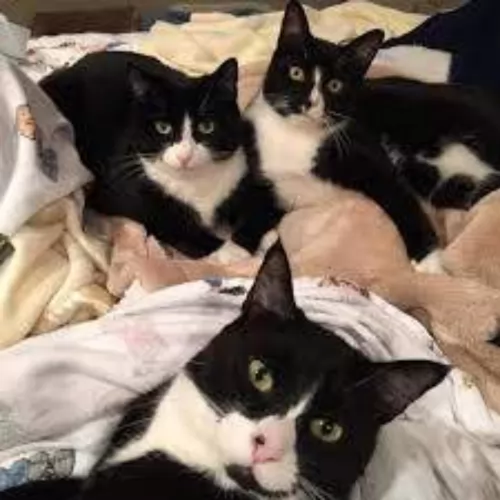 The Tuxedo cat is cared for in much the same way that you would care for any other cat really.
The Tuxedo cat is cared for in much the same way that you would care for any other cat really.
The coat of the Tuxedo requires no special treatment as the coat isn’t really ever long. Simply brush it at least once a week to reduce matting and dust collecting on the coat. You want to keep it shiny and sleek.
Provide a scratching post and a climbing tree as these are both taking care of natural instincts of a cat – to scratch and to leap.
Ensure your pet isn’t bored. Provide him with plenty of opportunities to have fun and to play. Provide him with interactive toys to keep him amused.
Cats like to sleep quite a bit so provide him with a nice soft bed in a quiet area.
If your Tuxedo is an indoor cat, he will need a litter box in a quiet area. Be sure to clean the litter box of feces every single day. Make sure that the actual litter is kept clean and tidy.
Your Tuxedo cat should be fed the same diet as any other cat. This is because every cat there is is a carnivore and their diet has to be made up of meat. A wet food diet or a dry food diet is available but make sure it is always of the highest quality. This will ensure your pet gets all the nutrients to ensure good health. Discuss your cat's s dietary needs with your vet if you are in any doubt.
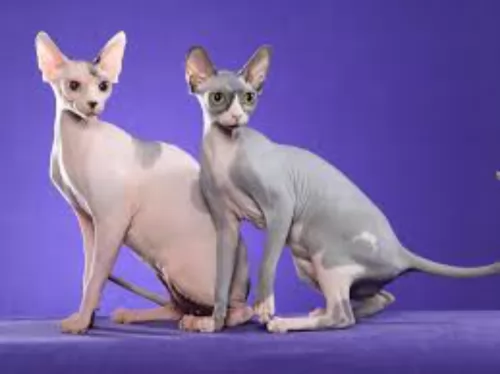 As with all cats, it's important to keep up your Ukrainian Levkoy's regular veterinary checkups. This means you can get to any health concerns early so that your vet can come up with a treatment plan for your pet.
As with all cats, it's important to keep up your Ukrainian Levkoy's regular veterinary checkups. This means you can get to any health concerns early so that your vet can come up with a treatment plan for your pet.
Some cat lovers make a point of scheduling yearly wellness visits with their vet, and this can be a good thing. Cats are natural scratchers so make sure you invest in a scratching post for him.
The inside of the Ukrainian Levkoy's ears should be examined regularly for signs of dirt and wax build-up. It can lead to infection. Speak to your vet about your cat's ears if yourself.
The Ukrainian Levkoy is an active cat and if he is an indoor cat, he will definitely need a climbing tree or some kind of cat perch to leap up onto.
The Ukrainian Levkoy is a hairless cat, so you won't brushing your cat's hair but he will need to have a bath. The skin can become oily and attract dirt. Diet is absolutely important. You'll need to make sure you're feeding your cat a high protein diet as every cat is a carnivore. A cat like this needs to stay in shape to avoid cat diseases related to being overweight.
Most Ukrainian Levkoys need to be kept warm, so you might well have to invest in a jacket or jersey to keep him warm on a cold day.